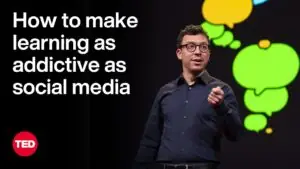The journey of learning a new language can evoke many different feelings: from the sheer excitement of catching new opportunities by the tail to helplessness because you just seem to forget every topic after a day. However, many people who know several languages, tend to say that it becomes easier every time you try. The same sentiment was shared online and sparked a discussion among people in the process of SLA or TLA (second and third language acquisition respectively).

✅ AI Essay Writer ✅ AI Detector ✅ Plagchecker ✅ Paraphraser
✅ Summarizer ✅ Citation Generator
Key Takeaways:
- Learning a Third Language is Often Easier than a Second: This might be due to the adaptability of the brain after mastering a second language, coupled with the experience gained during the process.
- Complex Factors Influence Language Learning: Language acquisition is not just about memorizing words and rules. Factors such as learning styles, individual characteristics, cultural understanding, and even the circumstances under which learning is happening (e.g., motivation, age, intention) play significant roles.
- Brain Adaptation to Learning is Multifaceted and Lifelong: The adaptability of the brain is influenced by various aspects, including use-dependent plasticity, emotional influence, and the learning environment. This understanding opens exciting prospects for personal development, education, and therapeutic interventions, emphasizing lifelong growth and learning potential.
Discovering the Linguistic Landscape
Learning a new language is more than just trying to remember a new set of words and grammar rules; it’s a doorway to expanding one’s worldview. With the world becoming increasingly interconnected, the ability to communicate in multiple languages has become invaluable, both personally and professionally. Whether for travel, business, or pure enjoyment, the adventure of learning a new language is quite challenging. This is especially true for people, who only have the experience of knowing one language, which is their native.
The discussion, as always, had sparked on Reddit. One of the users decided to share their experience of learning Thai after moving to Thailand, describing the initial challenges of the language’s writing system and tones. They mention how unforgiving native Thai speakers can be of mistakes, and how it took them three months to have a real conversation and four years to feel fluent.
“Not in an aggressive way, just not like… not understanding anything I said because my accent or grammar was wrong. Like if a Thai person in America said “go to mall where?” I would understand immediately what information they want. If you said the equivalent in Thai, they might look more confused than you.”
OP also notes that learning Japanese, their third language, seems easier and faster to grasp, especially in speaking, although finding language partners in Thailand is a challenge. They speculate that the brain might become more adaptable to learning new languages after mastering a second one. And, well, they are quite right.
If we decide to dive into the basics, the first thing is to understand what is exactly needed for a person to learn a new language. Many researchers (Brown & Gonzo, 1995; Ellis, 1997; Nunan, 1999) support the idea that there are three main principles in this, all of them equally important:
- The first principle, which is called comprehensible input (stress on the “in”), refers to a person hearing or receiving information in a new language and trying to understand it.
- The second principle, which is called comprehensible output (consequently, stress on the “out”), is centered around the person being able to produce words and write them down in a new language.
- The third principle, which may be called review or feedback, means to receive a reaction to your language practices and answer it accordingly (improve, remember the mistake, try to change).
However, if those three points were the only thing necessary to master a language, why don’t we all know 10+ languages? Let’s talk more about the actual process of learning a foreign language, especially if it doesn’t belong to your native language group.
The professor of Psychology and Linguistics at Pennsylvania State University Dr. Ping Li basically explains it as a mixture of various learning styles, individual characteristics, and, most importantly, different aspects of the language itself. In order to speak fluently (or at least be able to order a taxi or ask for directions), people have to do several things. It includes lexicon (the words) orthography (the writing), syntax (the grammar), phonology (the sounds), and pragmatics (ways to explain yourself through language). So, no wonder that people have such drastically different experiences when it comes to learning a new language. Not everybody is able to grasp mentioned concepts easily, as it is a process of trial and error.
Why Is It So Hard to Learn Your Second Language?
One common assumption about why this might be a tough task is the need to grasp a completely different set of rules, sounds, and structures. Unlike our native tongue, which we learn instinctively, a second language requires dedicated practice and often presents unfamiliar concepts. It makes the whole thing seem more complex. How close is this assumption to the truth?
It is kinda an obvious reason why learning a second language is much harder, but it can’t be completely due to the “unfamiliarity” factor. When starting to acquire a new skill set or a hobby, people tend to set an intent and make it clear, so to say, why exactly do they want to learn something new. Apart from that, the specific circumstances in which the language learning is happening matter to the level of “difficulty”. Jasone Cenoz highlighted this point further, explaining that there is quite a difference between being forced to learn Spanish in school and wanting to study Korean to travel. Moreover, factors like age and motivation highly influence the process. If the person has already lived for a long time, is there any “proper” motivation for them to power through a foreign language?

Another interesting fact that was brought up by some of the Redditors centers around people tending to perceive new words through the lens of their native language. Translating everything from one grammatical structure to another only adds another step to the process and makes things more complicated. One of the comments got many upvotes:
“Our brain almost has to rewire itself for language learning. When I was a monoglot, everything was through the lens of my native language. Thoughts, concepts, even dreams in a way were in English. Then I learned Spanish and it was rough. My mind passed all Spanish through English. It just made my comprehension and understanding of Spanish so hard because I had to translate and logically filter it via English; until I forced it not to. Then it figured it out that it could think and conceptualize in Spanish.”
But it’s not the only thing keeping people behind. Learning a second language is often a complex task because you also learn how to learn. This means figuring out the best way for you to understand and remember new information. It focuses on finding out how your brain works best. While this might make learning a new language seem tough, it also helps you understand more about how you think and learn, which can be a good thing.
“This is because while you’re learning your second language, you’re also learning how to learn a new language, including unlearning the assumptions you’ve made based on your first language.”
Well, as hard as learning a second language might be, we are sure that exploring new things and finding new ways to connect with people is worth it.
And Why Is It Easier to Learn Your Third?
You can’t say for sure that learning a third language is a piece of cake. However, it tends to be easier in comparison. Getting to know the culture behind the language can be a big help. Think of it like getting to know a friend better; the more you understand them, the easier it is to communicate. When you learn about the traditions, customs, and ways of thinking in the culture, the words and phrases start to make more sense. It’s like putting together a puzzle where the pieces are the words, and the picture is the culture. The more you know about the picture, the easier it is to fit the pieces together. That’s why practicing real-life scenarios and communicating with people from a different setting can make learning a new language more enjoyable and less tricky, as one of the comments pointed out:
“However, I noticed this fade as I passed the advanced beginner stage and recognized the complexities and intricacies of organic speech/texts from native speakers. Our ideas about the language and the learning process evolve as we authentically use the language to build relationships and accomplish real-world tasks. Interested to see if you still feel the same way about Japanese in a year!”
Another crucial thing to exercise in your language learning journey is to apply some of the knowledge you acquired while learning L2 when working with L3. Since most bilinguals are more experienced in this, they have potentially developed learning strategies to a larger extent. As we’ve previously mentioned, you find out the best approach to fit you in particular, since it can help get new experiences in the future.
“I grew up bilingual, and one of the things I’ve found in adulthood as I’ve started to learn languages as a hobby is that I find it quite easy relative to learning other skills or bits of information.”
Once again, after you get used to soaking in all the new words and grammatical concepts, you start applying them to real life much faster. This is a direct outcome of frequent practice that becomes less complicated each time you try. Practice makes perfect, doesn’t it?
“The more languages you know, the more different grammatical systems and rules you get familiar with, the easier it is to learn new systems and rules. This is why studies have shown that it is positive for children to be raised with multiple languages.”
“I’ve had the same experience and the more languages I learn, the better I become at it.”
“Once you’ve broken your brain of the need for things to map one-for-one to your native language, the third one definitely has an advantage.”
Learning a third language is not that easy, but knowing the culture can help. It’s like understanding a friend; the more you know, the easier it is to talk to them. Learning about the traditions, customs, and thought patterns of the culture helps words and phrases click into place. Practicing a lot and using what you’ve learned from other languages can make it a bit simpler, but it’s still a challenge. Ultimately, understanding two languages tends to facilitate the learning of the third, fourth, or fifth one, making each new language an much more reachable goal. The more languages you learn, the more you get the hang of it, especially when you have language tutors online who might help you even more.
How Our Brain Adapts to Learning
Learning anything, from languages to math to coding is some sort of a challenge for our brains. But how exactly does it work? The human brain is an extraordinary organ, constantly adapting and reorganizing itself to enhance learning and memory. Neuroplasticity, or the brain’s ability to change its own structure and function, is at the heart of this adaptation. As we learn new skills or information, neurons form new connections and strengthen existing ones, a process called synaptic plasticity. These connections create networks that enable us to understand, remember, and apply new knowledge. Moreover, certain parts of the brain, such as the hippocampus, are particularly involved in memory and learning, growing in response to new intellectual challenges. Adaptation to learning is a lifelong process, occurring not only during our formal education but throughout our entire lives. It ensures that we can continue to engage with new ideas and challenges, enriching our lives and empowering us to contribute to society.
Key aspects of brain adaptation include:
- Neuroplasticity: The ability of the brain to reorganize itself by forming new neural connections.
- Synaptic Plasticity: Changes in the strength of connections between neurons, fostering learning and memory.
- Growth of the Hippocampus: This region is especially involved in memory and can physically grow with learning challenges.
- Critical Periods: Certain learning tasks are easier during specific developmental windows.
- Metacognitive Strategies: The awareness and understanding of one’s own thought process, aiding in effective learning.
- Use-Dependent Plasticity: The more you use specific brain functions, the more they develop.
- Emotional Influence: Emotions can greatly affect the learning process, making it easier or harder to acquire new information.
- Environment and Context: The surrounding environment and context play a significant role in how the brain adapts to learning.
These insights into the adaptability of the human brain offer exciting prospects for educational strategies, therapeutic interventions, and personal development. By understanding how our brain changes and adapts to new learning experiences, we can maximize our potential and continue to grow throughout our lives.
Follow us on Reddit for more insights and updates.





Comments (0)
Welcome to A*Help comments!
We’re all about debate and discussion at A*Help.
We value the diverse opinions of users, so you may find points of view that you don’t agree with. And that’s cool. However, there are certain things we’re not OK with: attempts to manipulate our data in any way, for example, or the posting of discriminative, offensive, hateful, or disparaging material.